Dune (2019) Board Game
The Dune board game, released in 2019, is based on the iconic science fiction novel by Frank Herbert. The game is designed by Ilya Baranovsky and features artwork by Gale Force Nine, LLC. It is a strategic game that combines elements of bluffing, fighting, negotiation, and politics, mirroring the themes of the Dune universe.
Game Components of Dune
How To Setup Dune
Setting up Dune involves placing the game board, distributing the starting units and leaders according to each faction’s specific rules, and shuffling the Treachery and Traitor card decks. Each player selects a faction and places their units on the board as specified. The storm marker is placed on the board, and the spice tokens are prepared for distribution. Players also receive initial Treachery and Traitor cards.
Gameplay Mechanics and Game Objective
Mechanics:
Game Objective:
Player Experience
Playing Dune is an immersive and deeply strategic experience. The game requires players to navigate complex alliances, treacherous battles, and strategic resource management. Each faction’s unique abilities and the use of Treachery and Traitor cards add layers of intrigue and unpredictability. The game encourages diplomacy, betrayal, and calculated risk-taking, making it a challenging yet rewarding experience.
Pros
Cons
Personal Thoughts on Dune
Dune is for experienced board game enthusiasts who appreciate deep strategy, complex mechanics, and thematic immersion. It is not a game for casual players or those looking for a quick, light experience. The game demands attention to detail, strategic thinking, and a willingness to engage in diplomatic and treacherous maneuvers. If you enjoy games like Cosmic Encounter or are a fan of the Dune universe, this game is a must-play. However, new players may find it overwhelming, so it’s recommended to start with simpler factions and gradually learn the intricacies of the game.
We are supported by our audience. When you purchase through links on our site, we may earn an affiliate commission, at no extra cost for you. Learn more.

